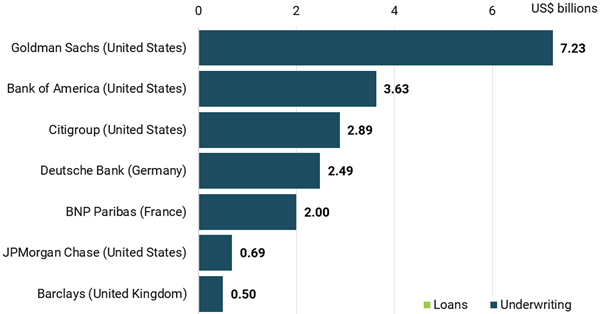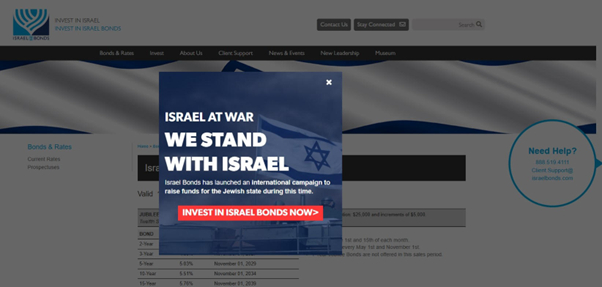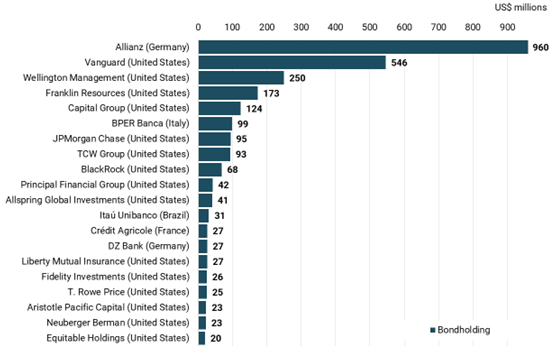Seven underwriters of “war bonds” instrumental in enabling Israel’s assault on Gaza, new research finds
Max Hammer, Human Rights Campaigner, BankTrack
Eva Gerritse, Project Lead Business, Conflict & Human Rights, PAX
Ward Warmerdam, Senior Financial Researcher, Profundo

Max Hammer, Human Rights Campaigner, BankTrack
Eva Gerritse, Project Lead Business, Conflict & Human Rights, PAX
Ward Warmerdam, Senior Financial Researcher, Profundo
An investigation conducted by Netherlands-based financial research group Profundo and published by Dutch NGOs BankTrack and PAX has found that a small number of investment banks have played a crucial role in helping Israel meet the “significant funding needs” arising from its war on Gaza by providing significant underwriting services to the Israeli state.(1)
The research finds that Israel issued sovereign bonds between October 7th, 2023 and January 2025 with a total value of $19.4 billion and reveals the seven banks that underwrote these bonds for the Israeli state.(2)
Goldman Sachs is by far the largest institution listed, having underwritten more than $7 billion in Israeli “war bonds” since the start of the Israel-Gaza war. The other financial institutions identified by the investigation are Bank of America, Deutsche Bank, BNP Paribas, Citi, Barclays, and JPMorgan Chase.

Financing the war on Gaza
Israel has ramped up its issuance of sovereign bonds significantly since October 7th, 2023, when Hamas-led militants launched a series of attacks and massacres in southern Israel, killing nearly 1,200 people and taking 252 Israeli citizens hostage. Since then, Israel’s military budget has ballooned as it has pursued a full-scale assault on the Gaza strip, which killed at least 46,600 Palestinians and displaced nearly the entire Palestinian population in the region before the agreement of a fragile ceasefire in January 2025.(3)
Though Israel’s sovereign debt is generally added to the overall state budget, reports confirm that more recent bonds were specifically issued to cover the costs of its war on Gaza.(4) In February last year, Ministry of Finance officials confirmed the country would need to sell “near-record amount of bonds” in 2024 to continue financing its war effort.(5) Israel Bonds, the government-affiliated body responsible for marketing Israel’s bonds to international investors, specifically advertises these bonds as opportunities to support “Israel at War”.(6) By underwriting and bringing Israel’s “war bonds” to market, the seven banks identified in Profundo’s investigation therefore facilitated crucial financing enabling Israel to continue its war on Gaza.

Buying “war bonds”
Profundo’s investigation also identifies the asset managers who have purchased Israeli government bonds since October 7th, 2023. These asset managers purchase bonds for their own funds as well as for their clients, which include pension funds and insurance companies, among others. The findings indicate that the 20 largest institutional investors – largely US asset managers and asset management arms of US banks and insurance companies – have provided more than $2.7 billion in financing to Israel through bond purchases since the start of the war.(7) The largest investor, PIMCO, the US subsidiary of German financial services company Allianz, alone purchased almost $1 billion in Israeli “war bonds”.

Max Hammer, Human Rights Campaigner at BankTrack, said:
"Israel’s war on Gaza has created one of the largest humanitarian catastrophes of the 21st century. By underwriting bonds which the Israeli state specifically issued to continue its genocidal war effort, banks risked making themselves complicit in these atrocities. Any financial institution or investor which helped Israel raise money for its military campaign must take urgent action to end and provide remedy for its contributions to widespread violations of international humanitarian law.”
Thomas Van Gool, Project Lead Israel-Palestine at PAX, said:
"Banks and asset managers’ investment in and underwriting of Israeli “war bonds” reflects a long history of corporate complicity in Israel's violations of international humanitarian law. Now that a fragile ceasefire has come into effect, financial institutions and businesses must take immediate action to redress their direct links to these violations. Beyond providing remedy for financially enabling atrocities in Gaza, this must involve an urgent review of all financial relationships with the Israeli state, its military oppression of Palestinians in Gaza, and its regimes of apartheid and occupation in the West Bank."
Editor's note - Human rights responsibilities and complicity risks
Banks’ human rights responsibilities:
Under the UN Guiding Principles on Business and Human Rights and the OECD Guidelines on Responsible Business Conduct, financial institutions, like all companies, have the responsibility to avoid contributing to adverse human rights impacts, e.g. by facilitating or incentivising a business relationship to cause harm. The OECD’s guidance on Due Diligence for Responsible Corporate Lending and Securities Underwriting clarifies that financial institutions may contribute to adverse human rights impacts if, by underwriting bonds, they enable the issuer to conduct human rights abuses.(8)
Genocide allegations against Israel:
Israel’s systematic military targeting of civilians, blockade of water, electricity, and humanitarian supplies, and destruction of infrastructure in the course of its military campaign have given rise to a widespread belief that Israel is committing genocide in Gaza. In January 2024, the International Court of Justice issued provisional measures against Israel under the Genocide Convention.(9) Since then, numerous human rights groups, including Amnesty International and Human Rights Watch, UN Special Rapporteurs as well as academic experts have concluded that Israel’s attack on Gaza amounted to acts of genocide.(10)
Banks’ and asset managers’ risk of complicity:
The Israeli government’s stated intent of using proceeds from its sovereign bonds to facilitate its assault on Gaza puts the underwriters of and investors in “war bonds” at risk of failing to uphold their human rights responsibilities. By underwriting and investing in sovereign bonds used to fund these attacks, banks and asset managers risk contributing to potential atrocity crimes, including war crimes, crimes against humanity, and genocide.
The weight of Israel’s well-documented violations of international law may place additional legal risks on the underwriters and investors identified by Profundo that extend beyond violations of international human rights norms. While financial institutions as corporations are not a party to the Genocide Convention or to other international law instruments, they or their employees risk being held liable for complicity in acts of genocide, as well as war crimes and crimes against humanity, under international or national criminal law if a court demonstrates that their actions constituted a substantial and knowing material contribution to alleged international crimes.(11)
In June 2024, in a call for a full arms embargo on Israel, UN experts noted that companies and financial institutions providing support to Israel’s military offensive may face ‘repercussions for complicity’ in serious violations of international human rights and international humanitarian law, possibly including genocide.(12) Similarly, as noted by Dr Pietropaoli in a legal opinion commissioned by SOMO and Al Haq, ‘companies investing in or partnering with the Israeli government or Israeli state-owned enterprises face a particularly salient risk of aiding, abetting, facilitating, or otherwise contributing to Israel’s commission of genocide or other violations of international humanitarian law.’(13) By underwriting and purchasing Israeli “war bonds”, banks and asset managers therefore risk providing direct material support to, and therefore aiding and abetting, Israel’s genocide, crimes against humanity and war crimes and may risk repercussions for complicity.
Notes
(1) Francesca Young, Israel returns to public bond market, Global Markets, March 2024
(2) Some of the sovereign debt issuances identified in Profundo’s research were initiated in the summer of 2023, but were only placed with the arrangement of the underwriters after October 7th, 2023.
(3) Alexander Kozul-Wright, Gaza war extends toll on Israel’s economy, Al Jazeera, August 2024.
Emma Farge & Nidal Al-Mughrabi, Gaza death toll: how many Palestinians has Israel's offensive killed?, Reuters January 2025.
(4) Mary McDougall, Ellesheva Kissin & Kate Duguid, Israel raises $6bn in borrowing bonanza to fund war against Hamas, FT, November 2023.
(5) Galit Altstein, Israel, just downgraded, readies bond spree to pay for war against Hamas, Bloomberg, February 2024.
(6) Israel Bonds, Israel at war, February 2025.
(7) In addition to bonds purchased by institutional investors, US municipalities and states have also acquired significant volumes of Israeli bonds directly. Further details on sovereign wealth fund and pension fund investments in Israeli “war bonds” - either directly or through asset managers - will gradually become available as pension funds publish their 2024 annual portfolio disclosures.
(9) International Court of Justice, Application of the Convention on the Prevention and Punishment of the Crime of Genocide in the Gaza Strip (South Africa v. Israel), January 2024.
(10) Amnesty International, ‘You feel like you are subhuman’: Israel’s genocide against Palestinians in Gaza, December 2024.
Human Rights Watch, Extermination and acts of genocide: Israel deliberately depriving Palestinians in Gaza of water, December 2024.
UN Human Rights Council, Rights expert finds ‘reasonable grounds’ genocide is being committed in Gaza, March 2024.
Arwa Mahdawi, We are witnessing the final stage of genocide in Gaza, Guardian, November 2024.
(11) Lydia De Leeuw & Max Lamb, Making a killing? State and corporate commercial ties to genocide in Gaza – and what governments and companies must do to prevent it, SOMO, April 2024.
(12) UN-OHCHR, States and companies must end arms transfers to Israel immediately or risk responsibility for human rights violations: UN experts, June 2024.
(13) Dr Irene Pietrapaoli, Obligations of third states and corporations to prevent and punish genocide in Gaza, Somo & Al-Haq, June 2024.
